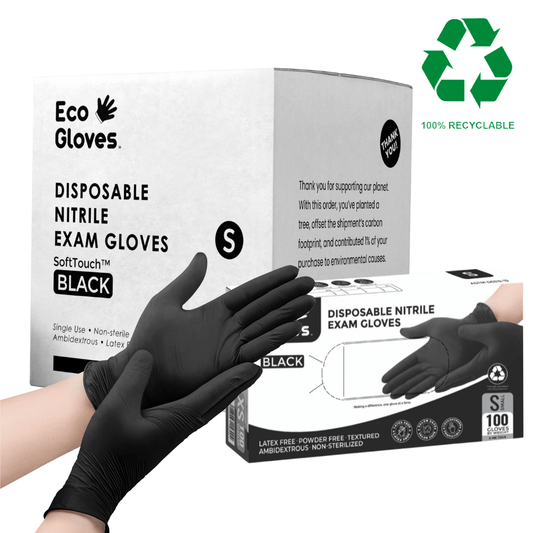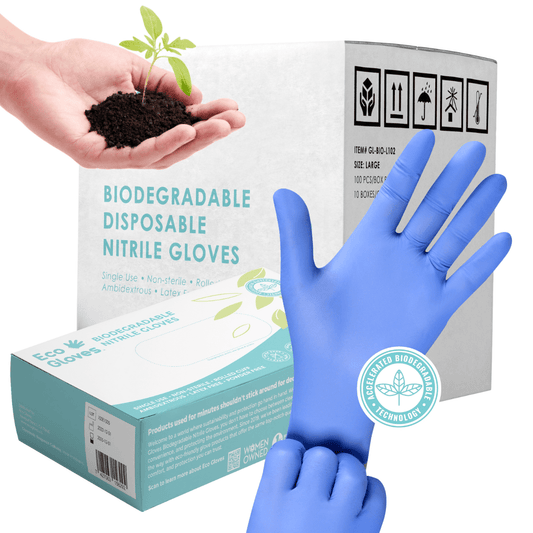The Ultimate Guide to Sustainable Disposable Gloves for Fast Food Drive-Thrus
Eco Gloves
Fast food chains, including global leaders like McDonald's, Starbucks, Subway, Taco Bell, and Chipotle, rely heavily on disposable gloves and other single-use items to maintain food safety, hygiene, and efficiency. However, the environmental impact of billions of disposable gloves entering landfills and oceans each year cannot be ignored. As consumer awareness grows, the demand for eco-friendly solutions is reshaping the industry. In this article we’ll look at how fast food chains are adapting and why eco-friendly disposable gloves are a smart choice for sustainability and compliance.
Topics Covered
- Understanding the Environmental Impact of Disposable Gloves in Foodservice
- How Long Disposable Gloves Take to Decompose: A Hidden Environmental Challenge
- The Role of Disposable Gloves in Ocean Pollution
- Why Fast Food Chains Are Embracing Sustainable Practices with Eco-Friendly Gloves
- Exploring Sustainable Options for Disposable Gloves in Fast Food Operations
- Top Features to Consider When Choosing Eco-Friendly Disposable Gloves
- Top Benefits of Switching to Eco-Friendly Gloves for Fast Food Franchises
- Frequently Asked Questions About Eco-Friendly Disposable Gloves for Fast Food
Understanding the Environmental Impact of Disposable Gloves in Foodservice
Fast food operations generate a massive volume of waste, and disposable gloves are a significant contributor. Globally, it is estimated that over 150 billion pairs of disposable gloves are used annually across various industries, with a substantial portion coming from the foodservice sector. Traditional plastic gloves, often made of materials like vinyl or polyethylene, take hundreds of years to break down due to their synthetic composition posing significant environmental challenges.

© 2024 Eco Gloves. All rights reserved. Visit www.ecogloves.co for more information.
How Long Disposable Gloves Take to Decompose: A Hidden Environmental Challenge
Polyethylene gloves, commonly used in fast food operations, are particularly resistant to decomposition. This long-lasting waste accumulates rapidly, creating a mounting environmental burden. In many cases, these gloves end up polluting oceans, harming marine life, and contributing to the global plastic crisis.

© 2024 Eco Gloves. All rights reserved. Visit www.ecogloves.co for more information.
The Role of Disposable Gloves in Ocean Pollution
A report by the United Nations Environment Programme (UNEP) highlights that approximately 19-23 million tons of plastic enter the oceans each year. While single-use gloves make up a small percentage of this total, their widespread use exacerbates the issue. Gloves discarded improperly or blown away during waste collection often end up in waterways, eventually reaching the ocean. Once there, they fragment into microplastics, which are ingested by marine life, disrupting ecosystems and entering the human food chain.
How Disposable Gloves Harm Marine Life and Ecosystems
Plastic gloves can entangle marine animals or be mistaken for food. A study by the World Wildlife Fund (WWF) notes that over 2,000 marine species are affected by plastic waste, leading to injuries, fatalities, and declining populations. For instance, sea turtles often mistake floating plastic gloves for jellyfish, their primary food source, with fatal consequences.

How Disposable Gloves Contribute to the Global Plastic Crisis
The foodservice industry is a significant contributor to the estimated 380 million tons of plastic waste produced globally each year, according to Our World in Data. Disposable gloves, while essential for food safety, exacerbate this crisis, particularly as many are not recyclable due to contamination with food or chemicals.
Why Fast Food Chains Are Embracing Sustainable Practices with Eco-Friendly Gloves
Recognizing this impact, global leaders in the fast food industry are exploring sustainable initiatives to reduce their environmental footprint. Some McDonald’s, Chipotle, and Taco Bell franchises have already started testing eco-friendly disposable gloves, seeking solutions that combine performance, safety, and reduced environmental impact. Others like Starbucks and Subway, have already committed to eliminating single-use plastics entirely, and adopting sustainable disposable wares and packaging.
The Importance of Disposable Gloves in Safe and Hygienic Food Preparation
Disposable gloves play a critical role in preventing cross-contamination in fast food kitchens. When handling raw meat, poultry, or vegetables, gloves act as a barrier to prevent the spread of harmful bacteria like salmonella and E. coli. However, improper glove usage or failure to switch gloves between tasks can negate these benefits.
The Key Roles That Rely on Disposable Gloves in Fast Food Chains
Disposable gloves are a critical tool for maintaining hygiene and efficiency across various roles in fast food operations. Here we outline just a few roles in a fast food chain that require the use of gloves for their work tasks:
Prep Cooks: During initial food preparation stages, gloves are essential to maintain hygiene and prevent contamination.
Line Chefs: Employees assembling meals wear gloves to protect food from direct contact and ensure compliance with health regulations.
Front Counter Staff: Drive-thru and counter employees often switch between food handling and cleaning, necessitating frequent glove changes.
Janitorial Staff: Staff responsible for maintaining cleanliness in workstations and public areas also rely on disposable gloves for sanitary protection.
These diverse applications highlight the integral role of disposable gloves in fast food chains, reinforcing their importance for both operational efficiency and customer safety.
Exploring Sustainable Options for Disposable Gloves in Fast Food Operations
Sustainable options for disposable gloves are becoming more prevalent, offering businesses practical solutions to address environmental concerns without compromising performance or safety. These green alternatives to disposable gloves are designed to reduce waste, minimize environmental impact, and meet the needs of industries such as food service, healthcare, and cleaning.
- Biodegradable gloves, such as those made from nitrile with accelerated degradation technology, break down significantly faster in landfills compared to traditional gloves, reducing long-term waste.
- Compostable gloves, crafted from plant-based materials like bioplastics, offer another eco-friendly alternative, decomposing in industrial composting facilities to return nutrients to the soil.
For businesses seeking to close the loop on waste, some manufacturers also offer recycling programs for used nitrile and vinyl gloves. These programs ensure gloves are processed into raw materials for new products, diverting waste from landfills and contributing to a circular economy.
Sustainable gloves also serve as safer alternatives to latex, which can trigger allergies and is increasingly regulated or banned in certain states. By embracing biodegradable, compostable, and recyclable gloves for foodservice, businesses can maintain hygiene standards while demonstrating their commitment to environmental responsibility—benefiting their operations, employees, customers, and the planet.
Top Features to Consider When Choosing Eco-Friendly Disposable Gloves
When choosing the eco-friendly disposable gloves, it’s important to consider features that ensure both environmental sustainability and reliable performance. From food safety to durability, these gloves should meet the demands of your tasks without compromising on quality or comfort. To help you navigate selecting the best disposable gloves for fast food operations, here are key features to look for in gloves and pro tips to make informed decisions:

© 2024 Eco Gloves. All rights reserved. Visit www.ecogloves.co for more information.
Common Mistakes to Avoid When Choosing Eco-Friendly Disposable Gloves
When selecting eco-friendly disposable sustainable gloves for eco-conscious fast food chains, it’s important to look beyond marketing claims and ensure you’re making informed choices that truly benefit the environment. Here are some does and don’ts to avoid common mistakes:

© 2024 Eco Gloves. All rights reserved. Visit www.ecogloves.co for more information.
Avoiding these common pitfalls ensures you select gloves that align with both your practical needs and your commitment to sustainability, helping to reduce glove waste in fast food and protect the environment.
Top Benefits of Switching to Eco-Friendly Gloves for Fast Food Franchises
Adopting eco-friendly practices, including the use of sustainable disposable gloves, offers franchise owners a competitive advantage in today’s market. One major benefit is compliance with evolving regulations. As governments at local, state, and federal levels implement stricter sustainability laws and bans on certain materials like latex or non-recyclable plastics, eco-friendly gloves help businesses stay ahead of these changes, avoiding fines and operational disruptions.
In addition, going eco-friendly fosters enhanced customer trust and loyalty. Consumers are increasingly drawn to businesses that demonstrate environmental responsibility, with many actively seeking out brands that align with their values. Using sustainable gloves signals to customers that your franchise is committed to reducing its environmental footprint, which can improve your reputation and attract a broader, eco-conscious customer base.
Eco-friendly gloves also contribute to operational sustainability. Many of these gloves are designed with advanced features such as durability and accelerated biodegradability, which reduce waste and lower long-term environmental impact. This positions your franchise as a forward-thinking, socially responsible business, potentially leading to positive media coverage and greater community support.
Finally, adopting sustainable drive-thru practices, like using compostable or biodegradable gloves for food preparation, can create cost efficiencies over time by aligning with broader corporate sustainability goals. These initiatives may also open up opportunities for partnerships or certifications that further validate your commitment to the environment. By choosing eco-friendly solutions, franchise owners can address customer expectations, meet regulatory requirements, and lead in the growing movement toward environmental responsibility.
Key Takeaways: Sustainable Disposable Gloves for Fast Food Drive-Thrus
-
Disposable Gloves Are Essential Yet Waste-Intensive: Fast food operations use billions of gloves annually, contributing to landfill buildup and ocean pollution.
-
Traditional Plastic Gloves Take Centuries to Break Down: Vinyl and polyethylene gloves are slow to decompose and can harm marine life when improperly disposed of.
-
Eco-Friendly Gloves Offer Viable Alternatives: Biodegradable nitrile and compostable bioplastic gloves reduce environmental impact while meeting food safety standards.
-
Fast Food Chains Are Leading Change: Brands like McDonald’s, Chipotle, and Starbucks are adopting or testing sustainable glove options to align with corporate responsibility goals.
-
Sustainable Options Support Compliance: Eco-friendly gloves help franchises meet evolving regulations banning certain plastics and latex in foodservice.
-
Operational Benefits Include Safety & Customer Trust: Durable, food-safe, sustainable gloves improve hygiene while boosting brand image and appealing to eco-conscious customers.
- Proper Disposal & Storage Are Key: Compostable gloves require industrial composting; biodegradable gloves should be landfill-disposed. Store all gloves in cool, dry conditions for maximum shelf life.
👉 Switching to eco-friendly gloves not only reduces environmental harm but also positions fast food brands as leaders in sustainability, compliance, and customer trust.
Frequently Asked Questions About Eco-Friendly Disposable Gloves for Fast Food
-
Why should fast food chains consider eco-friendly disposable gloves?
Eco-friendly gloves help reduce environmental waste, improve sustainability practices, and demonstrate a commitment to corporate social responsibility, which resonates with eco-conscious customers and aligns with evolving regulations.
-
What are the best types of eco-friendly disposable gloves for food handling?
Compostable gloves made from bioplastics and biodegradable nitrile gloves are ideal for food handling. They offer durability, food-grade hygiene compliance, and reduced environmental impact.
-
Are eco-friendly gloves safe for food preparation?
Yes. Eco-friendly gloves like biodegradable nitrile and compostable gloves are designed to meet food safety standards and are free from harmful chemicals like phthalates or BPA. Always check for food-grade compliance certification.
-
Do eco-friendly gloves cost more than traditional disposable gloves?
Eco-friendly gloves may have a slightly higher upfront cost but can lead to long-term savings by aligning with sustainability initiatives, reducing waste management costs, and enhancing brand loyalty.
-
Can eco-friendly gloves handle heavy-duty tasks like cleaning?
Yes. Many biodegradable nitrile gloves are designed for durability and tear resistance, making them suitable for heavy-duty tasks such as cleaning and handling greasy or wet items.
-
How can fast food chains dispose of used eco-friendly gloves responsibly?
Compostable gloves should be disposed of in industrial composting facilities, while biodegradable gloves can go to landfills, where they degrade faster than traditional gloves. Some brands also offer glove recycling programs.















